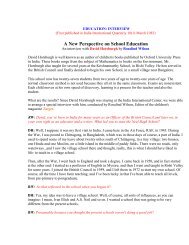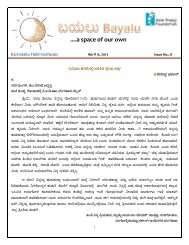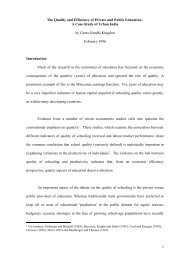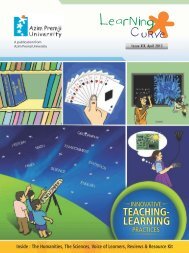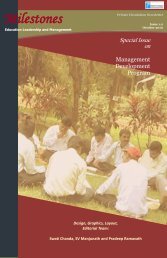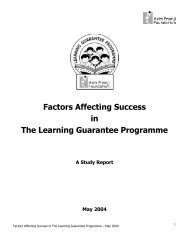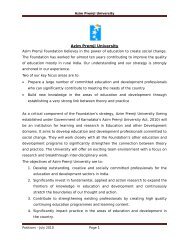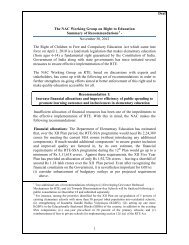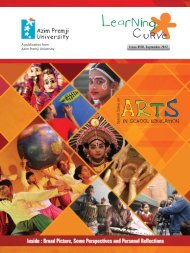Indesign Pagesnew.indd - Azim Premji Foundation
Indesign Pagesnew.indd - Azim Premji Foundation
Indesign Pagesnew.indd - Azim Premji Foundation
Create successful ePaper yourself
Turn your PDF publications into a flip-book with our unique Google optimized e-Paper software.
us. Contrast this to the dates of the Battle of Panipat or the<br />
changes brought about by King Ashoka...yawn! Wouldn’t we<br />
do better to know the changes being effected by our present<br />
government, the cheekier amongst us felt tempted to ask.<br />
And yes, Science was useful. It helped us fi gure out why<br />
milk soured, how plants grew and how to dress a wound.<br />
It inspired us to think more systematically and deductively.<br />
It made us enquire into the truth behind assumptions. It<br />
helped make our lives more comfortable. We needed it:<br />
even if we were unlucky enough to be taught the subject by<br />
a drone of a teacher.<br />
And oh! Sometimes, Science was even beautiful: from my<br />
early fascination of high school Chemistry to an experience<br />
of utter awe in my MSc days – at the intricacies of the DNA<br />
in our bodies – to me, beauty and Science seldom seemed<br />
incompatible. (Some lucky fellows had this experience in<br />
Math, but of them – another time.) Often, beauty was an<br />
overriding quality in determining my love for a subject.<br />
Poetry was neither useful nor relevant in my eyes: but yes,<br />
it was often beautiful. Literature, indeed, was rich with<br />
beauty: I couldn’t deny that. But gray was the colour I would<br />
have used to describe history and geography. (And colour<br />
just splashed in waves of bright purples and pinks all over<br />
Science, Literature and occasionally, even Math.)<br />
Even if social science hadn’t met these three criteria, I<br />
now tend to think that it would have somehow made it to<br />
our plates had it been just easy. Who doesn’t recall the<br />
satisfaction of solving a mathematical problem, and getting<br />
it right? The unique satisfaction in knowing that you had,<br />
somehow, managed to crack a problem - made Math just<br />
that much more tolerable. But here, you were right only if<br />
your memory happened not to fail you. You couldn’t think<br />
the answer through: or so we were led to believe.<br />
There fell the last prop that this subject may have had:<br />
it demanded too remarkable a memory from me. So I<br />
couldn’t wait to drop it: which I did, at the earliest available<br />
opportunity.<br />
Thus, history and geography constituted for me a bunch of<br />
facts that one could live life pretty well without remembering.<br />
Where were the patterns here? The trends? The connection<br />
to our own lives? These were either non-existent or buried<br />
beneath the huge number of facts that we had to remember.<br />
It wasn’t until my college years that it dawned on me that a<br />
study of the past could perhaps make one live the present<br />
Section E<br />
Why the Social Sciences Never Pulled Me<br />
better. However, I continued to feel that this seemed to be<br />
a lame excuse for thrusting that boring subject down our<br />
throats - for I couldn’t see a single person, community or<br />
nation around me making fewer mistakes (or living better<br />
lives) because they had learnt from their own history. That<br />
‘knowledge’ - if you could term it so - stayed safely ensconced<br />
between the dusty covers of their history textbooks: no one<br />
bothered to bring it into their everyday lives. A fascination<br />
that developed during my college years for reading<br />
biographies (of famous people) did lead me unconsciously<br />
down the alley of what I would now call ‘history’: but this<br />
was so very different! For people inhabited the pages of<br />
these wonderful books, in place of lifeless dates and boring<br />
events! My school history books seemed to be utterly devoid<br />
of the human element.<br />
Thus, history and geography constituted<br />
for me a bunch of facts that one could<br />
live life pretty well without remembering.<br />
Where were the patterns here? The<br />
trends? The connection to our own lives?<br />
These were either non-existent or buried<br />
beneath the huge number of facts that we<br />
had to remember.<br />
Decades later, when I was travelling in the Himalayas, and<br />
saw the numerous types of rock and stone, their varying<br />
textures and colours spoke eloquently to me of patterns<br />
in that terrain. Why had no one ever taught me this? I<br />
wondered. The terraced slopes in Uttarkashi, the unique<br />
cuisine of the mountainfolk and their preferred diets: these<br />
were as intriguing as they were relevant. By now, I was<br />
interested, you see, in knowing how these people lived. My<br />
excitement at walking down the cobbled streets of Pompeii –<br />
knowing that Roman emperors had trod these very stones –<br />
was palpable! Seeing the ruins of the Indus Valley Civilisation<br />
in Lothal was another time in my adult life when I saw the<br />
immense possibilities of learning history with excitement.<br />
Pg No: 129



